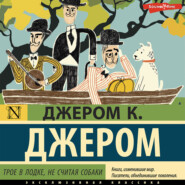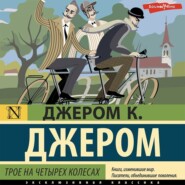По всем вопросам обращайтесь на: info@litportal.ru
(©) 2003-2024.
✖
Tommy and Co.
Настройки чтения
Размер шрифта
Высота строк
Поля
“Don’t know any reason myself why we shouldn’t see a little more of one another than we do,” suggested Grindley senior, shaking hands.
“Give us a look-up one Sunday afternoon,” suggested Solomon. “Bring the youngster with you.”
Solomon Appleyard and Hezekiah Grindley had started life within a few months of one another some five-and-thirty years before. Likewise within a few hundred yards of one another, Solomon at his father’s bookselling and printing establishment on the east side of the High Street of a small Yorkshire town; Hezekiah at his father’s grocery shop upon the west side, opposite. Both had married farmers’ daughters. Solomon’s natural bent towards gaiety Fate had corrected by directing his affections to a partner instinct with Yorkshire shrewdness; and with shrewdness go other qualities that make for success rather than for happiness. Hezekiah, had circumstances been equal, might have been his friend’s rival for Janet’s capable and saving hand, had not sweet-tempered, laughing Annie Glossop – directed by Providence to her moral welfare, one must presume – fallen in love with him. Between Jane’s virtues and Annie’s three hundred golden sovereigns Hezekiah had not hesitated a moment. Golden sovereigns were solid facts; wifely virtues, by a serious-minded and strong-willed husband, could be instilled – at all events, light-heartedness suppressed. The two men, Hezekiah urged by his own ambition, Solomon by his wife’s, had arrived in London within a year of one another: Hezekiah to open a grocer’s shop in Kensington, which those who should have known assured him was a hopeless neighbourhood. But Hezekiah had the instinct of the money-maker. Solomon, after looking about him, had fixed upon the roomy, substantial house in Nevill’s Court as a promising foundation for a printer’s business.
That was ten years ago. The two friends, scorning delights, living laborious days, had seen but little of one another. Light-hearted Annie had borne to her dour partner two children who had died. Nathaniel George, with the luck supposed to wait on number three, had lived on, and, inheriting fortunately the temperament of his mother, had brought sunshine into the gloomy rooms above the shop in High Street, Kensington. Mrs. Grindley, grown weak and fretful, had rested from her labours.
Mrs. Appleyard’s guardian angel, prudent like his protégé, had waited till Solomon’s business was well established before despatching the stork to Nevill’s Court, with a little girl. Later had sent a boy, who, not finding the close air of St. Dunstan to his liking, had found his way back again; thus passing out of this story and all others. And there remained to carry on the legend of the Grindleys and the Appleyards only Nathaniel George, now aged five, and Janet Helvetia, quite a beginner, who took lift seriously.
There are no such things as facts. Narrow-minded folk – surveyors, auctioneers, and such like – would have insisted that the garden between the old Georgian house and Nevill’s Court was a strip of land one hundred and eighteen feet by ninety-two, containing a laburnum tree, six laurel bushes, and a dwarf deodora. To Nathaniel George and Janet Helvetia it was the land of Thule, “the furthest boundaries of which no man has reached.” On rainy Sunday afternoons they played in the great, gloomy pressroom, where silent ogres, standing motionless, stretched out iron arms to seize them as they ran. Then just when Nathaniel George was eight, and Janet Helvetia four and a half, Hezekiah launched the celebrated “Grindley’s Sauce.” It added a relish to chops and steaks, transformed cold mutton into a luxury, and swelled the head of Hezekiah Grindley – which was big enough in all conscience as it was – and shrivelled up his little hard heart. The Grindleys and the Appleyards visited no more. As a sensible fellow ought to have seen for himself, so thought Hezekiah, the Sauce had altered all things. The possibility of a marriage between their children, things having remained equal, might have been a pretty fancy; but the son of the great Grindley, whose name in three-foot letters faced the world from every hoarding, would have to look higher than a printer’s daughter. Solomon, a sudden and vehement convert to the principles of mediæval feudalism, would rather see his only child, granddaughter of the author of The History of Kettlewell and other works, dead and buried than married to a grocer’s son, even though he might inherit a fortune made out of poisoning the public with a mixture of mustard and sour beer. It was many years before Nathaniel George and Janet Helvetia met one another again, and when they did they had forgotten one another.
* * * * *
Hezekiah S. Grindley, a short, stout, and pompous gentleman, sat under a palm in the gorgeously furnished drawing-room of his big house at Notting Hill. Mrs. Grindley, a thin, faded woman, the despair of her dressmaker, sat as near to the fire as its massive and imposing copper outworks would permit, and shivered. Grindley junior, a fair-haired, well-shaped youth, with eyes that the other sex found attractive, leant with his hands in his pockets against a scrupulously robed statue of Diana, and appeared uncomfortable.
“I’m making the money – making it hand over fist. All you’ll have to do will be to spend it,” Grindley senior was explaining to his son and heir.
“I’ll do that all right, dad.”
“I’m not so sure of it,” was his father’s opinion. “You’ve got to prove yourself worthy to spend it. Don’t you think I shall be content to have slaved all these years merely to provide a brainless young idiot with the means of self-indulgence. I leave my money to somebody worthy of me. Understand, sir? – somebody worthy of me.”
Mrs. Grindley commenced a sentence; Mr. Grindley turned his small eyes upon her. The sentence remained unfinished.
“You were about to say something,” her husband reminded her.
Mrs. Grindley said it was nothing.
“If it is anything worth hearing – if it is anything that will assist the discussion, let’s have it.” Mr. Grindley waited. “If not, if you yourself do not consider it worth finishing, why have begun it?”
Mr. Grindley returned to his son and heir. “You haven’t done too well at school – in fact, your school career has disappointed me.”
“I know I’m not clever,” Grindley junior offered as an excuse.
“Why not? Why aren’t you clever?”
His son and heir was unable to explain.
“You are my son – why aren’t you clever? It’s laziness, sir; sheer laziness!”
“I’ll try and do better at Oxford, sir – honour bright I will!”
“You had better,” advised him his father; “because I warn you, your whole future depends upon it. You know me. You’ve got to be a credit to me, to be worthy of the name of Grindley – or the name, my boy, is all you’ll have.”
Old Grindley meant it, and his son knew that he meant it. The old Puritan principles and instincts were strong in the old gentleman – formed, perhaps, the better part of him. Idleness was an abomination to him; devotion to pleasure, other than the pleasure of money-making, a grievous sin in his eyes. Grindley junior fully intended to do well at Oxford, and might have succeeded. In accusing himself of lack of cleverness, he did himself an injustice. He had brains, he had energy, he had character. Our virtues can be our stumbling-blocks as well as our vices. Young Grindley had one admirable virtue that needs, above all others, careful controlling: he was amiability itself. Before the charm and sweetness of it, Oxford snobbishness went down. The Sauce, against the earnest counsel of its own advertisement, was forgotten; the pickles passed by. To escape the natural result of his popularity would have needed a stronger will than young Grindley possessed. For a time the true state of affairs was hidden from the eye of Grindley senior. To “slack” it this term, with the full determination of “swotting” it the next, is always easy; the difficulty beginning only with the new term. Possibly with luck young Grindley might have retrieved his position and covered up the traces of his folly, but for an unfortunate accident. Returning to college with some other choice spirits at two o’clock in the morning, it occurred to young Grindley that trouble might be saved all round by cutting out a pane of glass with a diamond ring and entering his rooms, which were on the ground-floor, by the window. That, in mistake for his own, he should have selected the bedroom of the College Rector was a misfortune that might have occurred to anyone who had commenced the evening on champagne and finished it on whisky. Young Grindley, having been warned already twice before, was “sent down.” And then, of course, the whole history of the three wasted years came out. Old Grindley in his study chair having talked for half an hour at the top of his voice, chose, partly by reason of physical necessity, partly by reason of dormant dramatic instinct, to speak quietly and slowly.
“I’ll give you one chance more, my boy, and one only. I’ve tried you as a gentleman – perhaps that was my mistake. Now I’ll try you as a grocer.”
“As a what?”
“As a grocer, sir – g-r-o-c-e-r – grocer, a man who stands behind a counter in a white apron and his shirt-sleeves; who sells tea and sugar and candied peel and such-like things to customers – old ladies, little girls; who rises at six in the morning, takes down the shutters, sweeps out the shop, cleans the windows; who has half an hour for his dinner of corned beef and bread; who puts up the shutters at ten o’clock at night, tidies up the shop, has his supper, and goes to bed, feeling his day has not been wasted. I meant to spare you. I was wrong. You shall go through the mill as I went through it. If at the end of two years you’ve done well with your time, learned something – learned to be a man, at all events – you can come to me and thank me.”
“I’m afraid, sir,” suggested Grindley junior, whose handsome face during the last few minutes had grown very white, “I might not make a very satisfactory grocer. You see, sir, I’ve had no experience.”
“I am glad you have some sense,” returned his father drily. “You are quite right. Even a grocer’s business requires learning. It will cost me a little money; but it will be the last I shall ever spend upon you. For the first year you will have to be apprenticed, and I shall allow you something to live on. It shall be more than I had at your age – we’ll say a pound a week. After that I shall expect you to keep yourself.”
Grindley senior rose. “You need not give me your answer till the evening. You are of age. I have no control over you unless you are willing to agree. You can go my way, or you can go your own.”
Young Grindley, who had inherited a good deal of his father’s grit, felt very much inclined to go his own; but, hampered on the other hand by the sweetness of disposition he had inherited from his mother, was unable to withstand the argument of that lady’s tears, so that evening accepted old Grindley’s terms, asking only as a favour that the scene of his probation might be in some out-of-the-way neighbourhood where there would be little chance of his being met by old friends.
“I have thought of all that,” answered his father. “My object isn’t to humiliate you more than is necessary for your good. The shop I have already selected, on the assumption that you would submit, is as quiet and out-of-the-way as you could wish. It is in a turning off Fetter Lane, where you’ll see few other people than printers and caretakers. You’ll lodge with a woman, a Mrs. Postwhistle, who seems a very sensible person. She’ll board you and lodge you, and every Saturday you’ll receive a post-office order for six shillings, out of which you’ll find yourself in clothes. You can take with you sufficient to last you for the first six months, but no more. At the end of the year you can change if you like and go to another shop, or make your own arrangements with Mrs. Postwhistle. If all is settled, you go there to-morrow. You go out of this house to-morrow in any event.”
Mrs. Postwhistle was a large, placid lady of philosophic temperament. Hitherto the little grocer’s shop in Rolls Court, Fetter Lane, had been easy of management by her own unaided efforts; but the neighbourhood was rapidly changing. Other grocers’ shops were disappearing one by one, making way for huge blocks of buildings, where hundreds of iron presses, singing day and night, spread to the earth the song of the Mighty Pen. There were hours when the little shop could hardly accommodate its crowd of customers. Mrs. Postwhistle, of a bulk not to be moved quickly, had, after mature consideration, conquering a natural disinclination to change, decided to seek assistance.
Young Grindley, alighting from a four-wheeled cab in Fetter Lane, marched up the court, followed by a weak-kneed wastrel staggering under the weight of a small box. In the doorway of the little shop, young Grindley paused and raised his hat.
“Mrs. Postwhistle?”
The lady, from her chair behind the counter, rose slowly.
“I am Mr. Nathaniel Grindley, the new assistant.”
The weak-kneed wastrel let fall the box with a thud upon the floor. Mrs. Postwhistle looked her new assistant up and down.
“Oh!” said Mrs. Postwhistle. “Well, I shouldn’t ’ave felt instinctively it must be you, not if I’d ’ad to pick you out of a crowd. But if you tell me so, why, I suppose you are. Come in.”
The weak-kneed wastrel, receiving to his astonishment a shilling, departed.
Grindley senior had selected wisely. Mrs. Postwhistle’s theory was that although very few people in this world understood their own business, they understood it better than anyone else could understand it for them. If handsome, well-educated young gentlemen, who gave shillings to wastrels, felt they wanted to become smart and capable grocers’ assistants, that was their affair. Her business was to teach them their work, and, for her own sake, to see that they did it. A month went by. Mrs. Postwhistle found her new assistant hard-working, willing, somewhat clumsy, but with a smile and a laugh that transformed mistakes, for which another would have been soundly rated, into welcome variations of the day’s monotony.
“If you were the sort of woman that cared to make your fortune,” said one William Clodd, an old friend of Mrs. Postwhistle’s, young Grindley having descended into the cellar to grind coffee, “I’d tell you what to do. Take a bun-shop somewhere in the neighbourhood of a girls’ school, and put that assistant of yours in the window. You’d do a roaring business.”
“There’s a mystery about ’im,” said Mrs. Postwhistle.
“Know what it is?”
“If I knew what it was, I shouldn’t be calling it a mystery,” replied Mrs. Postwhistle, who was a stylist in her way.
“How did you get him? Win him in a raffle?”
“Jones, the agent, sent ’im to me all in a ’urry. An assistant is what I really wanted, not an apprentice; but the premium was good, and the references everything one could desire.”
“Grindley, Grindley,” murmured Clodd. “Any relation to the Sauce, I wonder?”
“A bit more wholesome, I should say, from the look of him,” thought Mrs. Postwhistle.
The question of a post office to meet its growing need had long been under discussion by the neighbourhood. Mrs. Postwhistle was approached upon the subject. Grindley junior, eager for anything that might bring variety into his new, cramped existence, undertook to qualify himself.
Within two months the arrangements were complete. Grindley junior divided his time between dispensing groceries and despatching telegrams and letters, and was grateful for the change.

















